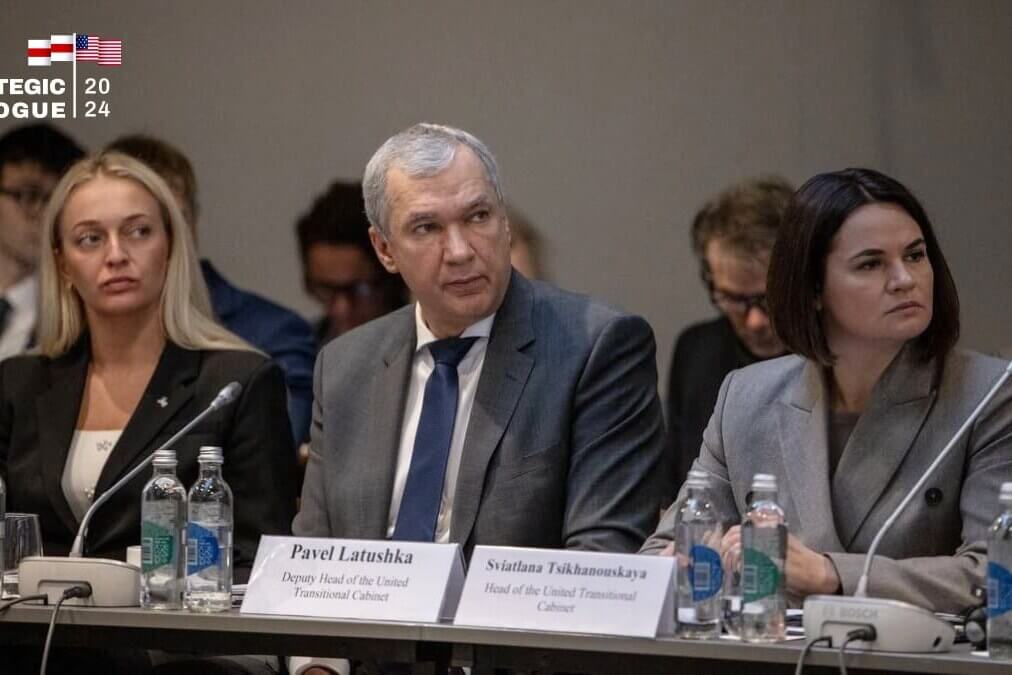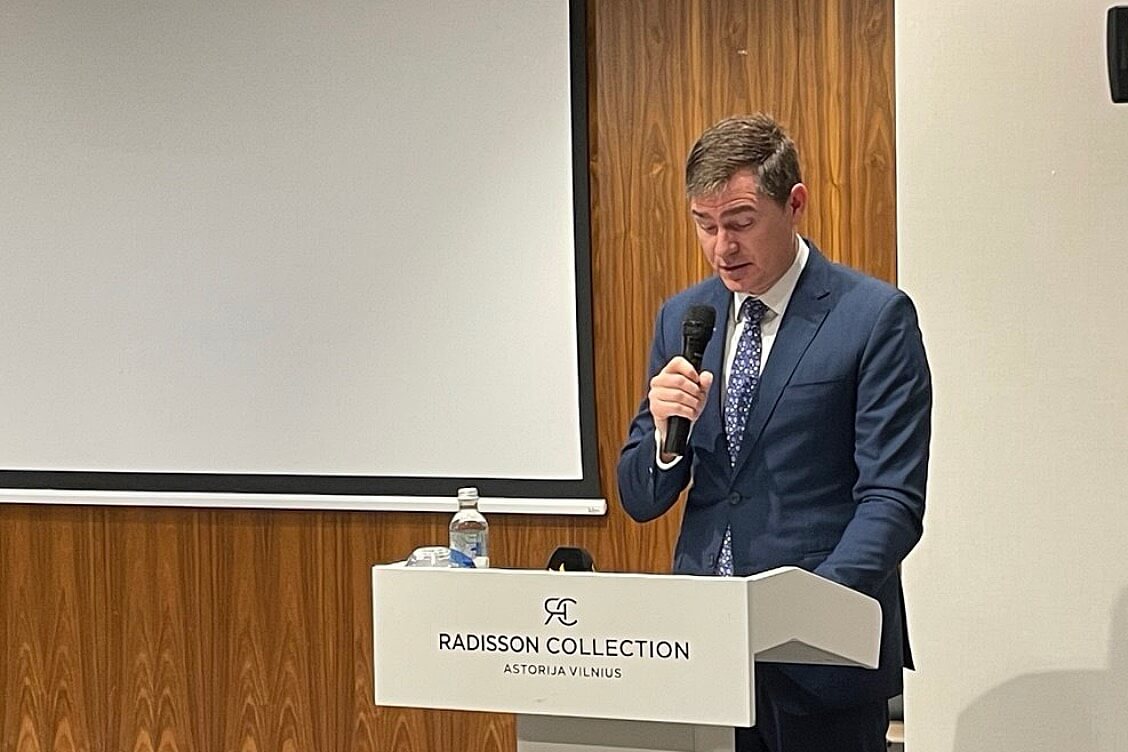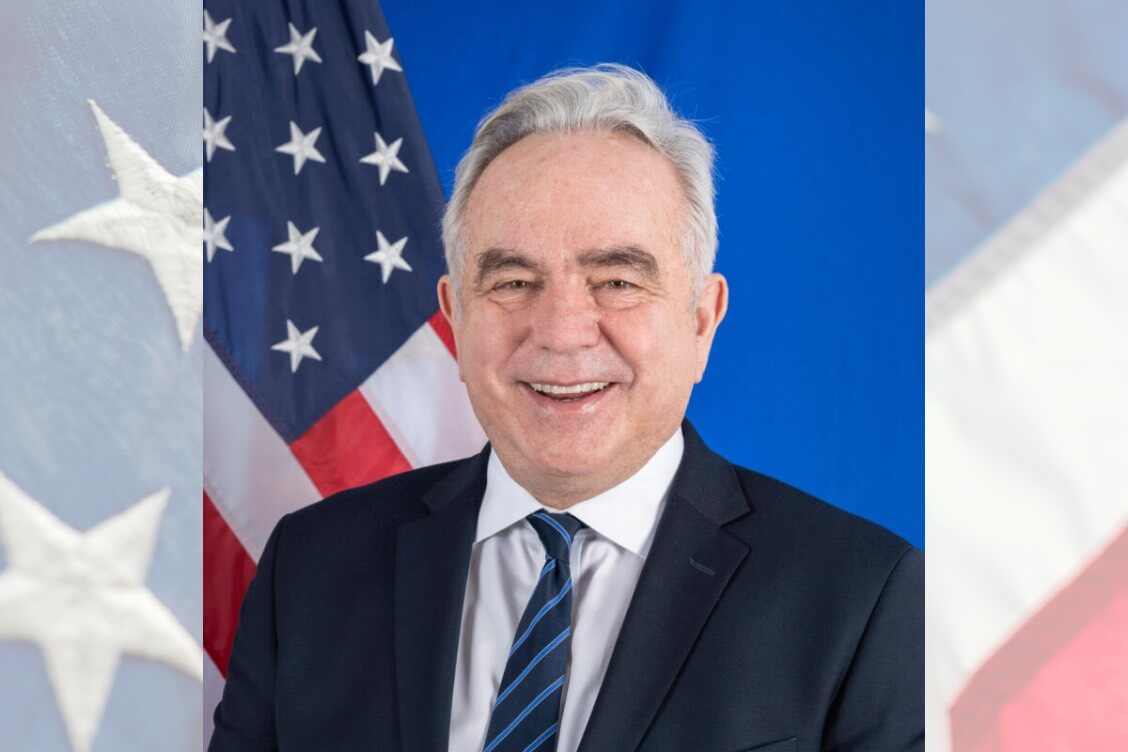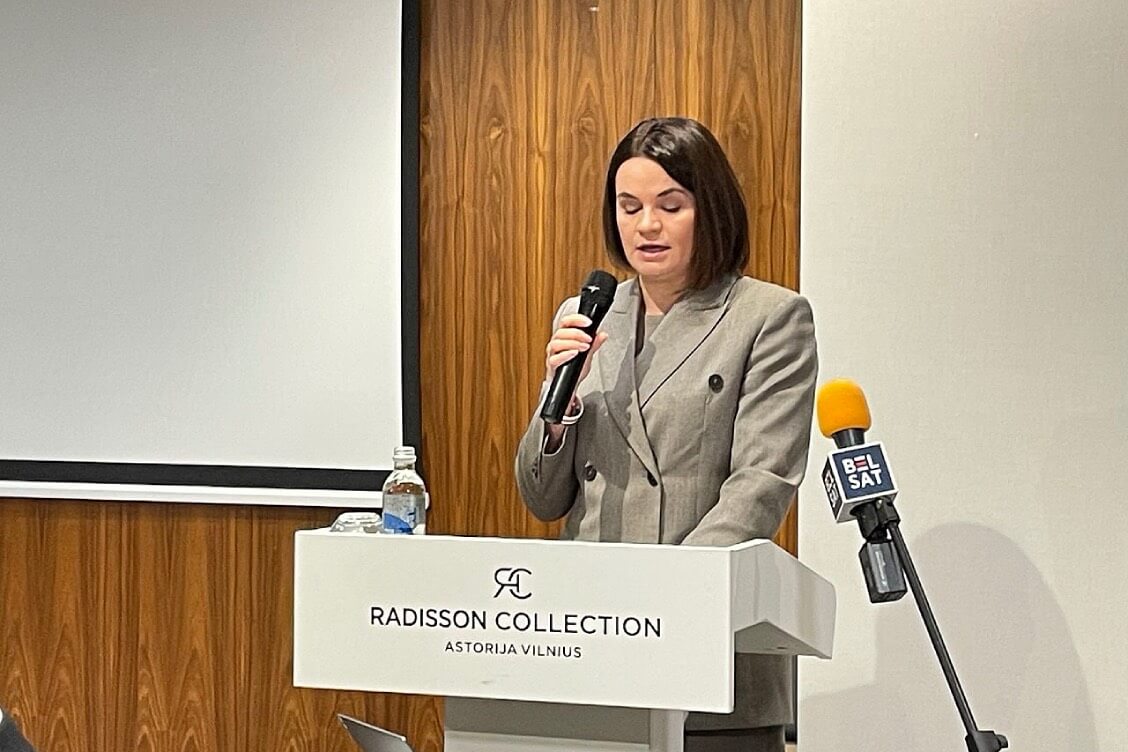Strategic dialogue between Belarusian pro-democracy forces and United States
The Belarusian embassy in Washington has accused the United States of “blatant interference” in the internal affairs of Belarus in connection with the strategic dialogue.
“Today, our country and our people are united as never before and are ready to successfully suppress and contain any interference aimed at undermining the independence and sovereignty of the Republic of Belarus,” it stated.
It said that “the leadership of Belarus is accountable only to the Belarusian people” and “knows best how to hold free and fair elections without pandering to the senseless desires and whims of Western ‘democratizers.'”
Earlier today, the US Department of State said the 2025 presidential election in Belarus was the main topic of the dialogue.
Today 
and Belarusian civil society representatives. We stand with Belarusians as they courageously fight for a free, democratic and sovereign Belarus, said the US Embassy in Minsk.
January’s election key topic of strategic dialogue
December 4, Pozirk. The so-called election scheduled for January has become a key topic during the second strategic dialogue between the Belarusian pro-democracy movement and the United States, the Department of State said.
“Both sides observed that Łukašenka has promoted a climate of fear under which no electoral processes could be called democratic, and the regime’s human rights abuses have effectively frozen genuine political activities and discourse inside Belarus. The United States calls on the regime to hold free and fair elections under international observation,” it said in a press release.
It called for the unconditional release of some 1,300 political prisoners and pledged to promote accountability for the regime’s human rights abuses. It also highlighted US programs to enhance and preserve Belarusians’ national and cultural identity.
“Strategic Dialogue participants also discussed the Łukašenka regime’s destabilizing impact on regional security. The United States condemned the regime’s complicity in Russia’s war against Ukraine and highlighted meaningful steps taken to expose and cut off the flow of crucial support and components through Belarus that have helped fuel Russia’s aggression,” the Department of State emphasized.
It supported Belarusians’ aspirations for a sovereign, democratic future and saluted “the tens of thousands of courageous Belarusians who have taken, and continue to take, incalculable risks in pursuit of their freedom.”
Since August 2020, the USA has provided more than $140 million in assistance to the Belarusian pro-democracy movement. It has also provided $1.5 million to support investigations and case building and more than $1.1 million in public diplomacy grants.
Łatuška: Belarus not bargaining chip, Belarusians not expendables

December 4, Pozirk. Pavieł Łatuška, deputy chairman of the United Transitional Cabinet (UTC) and head of the National Anti-Crisis Management (NAM), has called on the participants in the second strategic dialogue between the Belarusian pro-democracy movement and the United States to define a specific goal for their strategy on Belarus.
“According to the general opinion of the UTC, the Office of Śviatłana Cichanoŭskaja and the majority in the Coordination Council, the goal of the strategy should be a democratic Belarus outside Russia’s sphere of influence. Belarus as an integral part of the European and Euro-Atlantic community and security system. Otherwise, there will be neither peace nor security,” Łatuška noted.
The politician called on the United States not to decide the fate of Belarusians behind their backs and outlined specific tools for implementing a successful strategy, such as support for civil society, independent media and bloggers. According to Łatuška, it is also important to recognize the pro-democracy forces’ political institutions, not Łukašenka. He called for tougher sanctions on the regime and for Łukašenka to be held accountable “for the crimes he has committed.”
“Strategic dialogue means that we should talk about the strategy for achieving our goal, an independent, democratic and European Belarus. About the strategy for stopping the aggressors, restoring security and depriving them of resources and spheres of influence. Belarus is one of the cornerstones of this strategy,” Łatuška said.
He argued that while the West has been taking limited measures, while Moscow has a comprehensive strategy. “Russia is the only country that has a strategy not only for Belarus, but also for the region. This is a strategy for expanding the empire. Therefore, Belarus cannot be a gift for Putin in peace talks. Belarus is not a bargaining chip. Belarusians are not expendables,” the politician said.
He noted that Łukašenka’s Belarus is Russia’s military foothold, which can be used at any moment, and a sanctions loophole. Since the two countries have a common customs area, Russia gets the goods it needs to continue the war through its western ally, he said.
Belarusian opposition leader Śviatłana Cichanoŭskaja (abridged):
When we speak about policy towards Belarus, the key word would be consistency. This is what we expect from the United States and all our democratic allies.
I ask you to stick with a four-pillar strategy on Belarus:
Pressure on the regime, and here I mean economic sanctions without loopholes, sanctions on Russia, secondary sanctions. Pressure is key to release political prisoners and weaken the regime.
Assistance – to people, civil society, media, human rights defenders, the repressed, and our democratic institutions.
Accountability – bringing perpetrators to justice and documenting their crimes. This can also help to split elites and nomenklatura.
Commitment – to show Belarusians an alternative. To show Belarusians that they have a future and that they won’t be alone when the transition comes.
On the practical level, I very much hope that the United States will finally appoint the special envoy. That would be an important message to Belarusians.
I ask you to continue supporting our democratic institutions, and include us in the international fora, such as G7 or OSCE. I ask you to consider raising the question of Belarus in the UN Security Council.
We need to counter Russian narratives in Belarus. And here, I ask you to consider launching Voice of America Belarus service, and increasing support for RFE/RL Belarus service.
I ask you to include the Belarus issue in the possible talks on Ukraine, to ensure our voice is heard.
Many talk now about ending the war, about a peace agreement with Russia. But it must not come at any price. My biggest fear is that Belarus can be given to Putin as a consolation prize. Therefore, we must demand the withdrawal of Russian troops not only from Ukraine, but from Belarus as well. Including Russian nuclear weapons.
We must demand the demilitarization of Belarus and its comprehensive political reform. The voice of the United States can be decisive in this discussion.
Christopher Bergaust, deputy coordinator of US assistance to Europe and Eurasia (abridged):

The United States support of free, independent, and democratic Belarus continues for decades. This support is bipartisan and is enduring across administrations. I’d like to highlight that since 2020, the United States has provided more than $140 million in bilateral assistance to support Belarus.
Much of this assistance has been through USAID, which has partnered with the Belarusian people for 20 years in a variety of programs, exchanges and other activities.
Perhaps the most concrete symbol of this partnership and collaboration is the dedicated USAID office space in Vilnius to support USA’s Belarus program, which recently celebrated its official opening just a few months ago.
We’ve foreseen that USAID can return to Belarus sometime soon, but until then, the Vilnius office will continue to showcase our support to the Belarusian people as you strive for a sovereign, democratic and prosperous country.
We recognize the intense efforts the regime has taken to thwart your calls for a democratic country. And we are committed to maintaining pressure on the regime and to end domestic repression, to release all unjustly detained political prisoners, to hold free and fair elections under international observation and to stop its complicity in Russia’s war of aggression against Ukraine.
I’d like to reiterate that the United States will continue to maintain our support to the democratic aspirations of the Belarusian people, both through our engagement with the structures of Belarus’ democratic movement.
We welcome and appreciate the recent releases of political prisoners, especially those of urgent humanitarian needs. We also remain firm in our call for the unconditional release of the estimated 1,300 political prisoners being held throughout Belarus and demand of the regime end its violence and repression.
We will continue to promote accountability for the regime’s human rights abuses and its complicity in Russia’s illegal and unjust war in Ukraine. We will continue our support to promote people-to-people ties to build bonds of democracy between American and Belarusian people.
We will continue our programs to protect Belarusians’ unique national and cultural identity, including your language, literature, arts and history.
We look forward to a constructive and fruitful discussion today and continue to work with you as you strive for a sovereign and democratic future.
Deputy Secretary Kurt Campbell: Hello from Washington. As you engage in strategic dialogue today, I am pleased to express our continued support for a future democratic, sovereign, and stable Belarus that respects human rights.
Every day courageous Belarusians are taking risks to support basic freedoms for all Belarusian people, and the United States is proud to support your hard work.

Meanwhile the Łukašenka regime continues to show complete disregard for human rights and the well-being of the people of Belarus. In the four years since the fraudulent 2020 elections, Łukašenka has systematically dismantled any remaining semblance of a free society.
We know that the regime has continued to target the friends, the family, and the loved ones of members of the democratic movement to try to intimidate and silence those who still dare to oppose him.
Meanwhile, Belarusians watch as the regime cede sovereignty to Russia and deepens economic ties with China and other countries willing to turn a blind eye to his human rights abuses in the hopes of evading sanctions and other accountability measures.
But we are not deterred. The United States has been with you working to hold the Łukašenka regime accountable through tough sanctions in response to Łukašenka’s deplorable human rights record and to his enabling of Russia’s full-scale invasion of Ukraine.
The United States has announced five tranches of sanctions on Belarusian individuals and entities in 2024 alone, often in coordination with like-minded nations to ensure the maximum impact on the Łukašenka regime and its allies and send a strong message that their actions will not go unpunished.
This year alone, 76 individuals and entities have been designated, and over 200 individuals total have been designated since 2020.
We continue to support Belarusians in your efforts to bring about a democratic nation through exchange programs, fellowships, and other collaborations in support of building a stronger civil society.
We know your work is not easy. While the regime has scheduled elections for January 26, 2025, it is clear they will be neither free nor fair, as they will be held against the backdrop of a campaign of continuing fear and repression.
Łukašenka’s policies and deference to Russia, so instability and risk in staring Belarus in conflict, the Belarusian people do not want.
The recent incursion of drones into Belarusian airspace are testament to the dangerous game Łukašenka has been playing since he helped enable Russia’s full-scale invasion of Ukraine.
Despite these challenges, the United States remains hopeful. That’s because of you and the tens of thousands of others in and outside of Belarus who stand for freedom and a democratic Belarus.
We applaud your movement and we urge you to keep home. We hope this strategic dialogue will generate meaningful ways the United States can continue to support you. Our support for a future democratic, sovereign, and stable Belarus remains constant and we will continue to support your efforts to realize a brighter future for your country.

December 4, Pozirk. Belarusian opposition leader Śviatłana Cichanoŭskaja has expressed hope that the new round of Belarusian opposition’s strategic dialogue with the United States will result in new ideas for cooperation.
“We need to develop concrete steps on what can be done in the coming months and next year,” she said at the opening ceremony in Vilnius.
The politician stressed the importance of maintaining pressure on Alaksandar Łukašenka and his officials, securing the foundations of a democratic state and protecting Belarus’ independence from Russian domination.
“Belarus is not an isolated struggle. It is a battleground for the soul of Europe,” she stressed. “Without free Belarus, there can be no lasting security for Ukraine, Poland, or the rest of our region. Our fight is interconnected, as are our futures.”
Belarusian pro-democracy forces launched the strategic dialogue with the US one year ago in Washington, DC. Designed as an annual event, it is a platform for maintaining relations between the Belarusian opposition and the US government.
Its second round in Vilnius focuses on promoting democratic transition in Belarus, protecting human rights and ensuring authorities’ accountability for human rights abuses and support of Russia’s war on Ukraine.
Participants will also discuss strengthening independent media, ensuring the strategic importance of the private sector for democracy in Belarus and safeguarding national culture and identity.
- Politics, SocietyOpposition will not issue New Belarus Passports until legal issues are sorted outThe material is available only to POZIRK+
- Politics, SecurityLatvian defense minister urges citizens not to travel to Belarus, RussiaThe material is available only to POZIRK+
- Elections, PoliticsThree more presidents congratulate Łukašenka after supposed election winThe material is available only to POZIRK+
- PoliticsUN women's rights panel discusses Belarusian political prisonersThe material is available only to POZIRK+
- PoliticsProsecutors send blogger Biaspałaŭ's case to Supreme Court to determine jurisdictionThe material is available only to POZIRK+
- PoliticsMEPs welcome Šarenda-Panasiuk's release as important step to address rights abusesThe material is available only to POZIRK+
- PoliticsComedian Kamisaranka added to "terrorist" listThe material is available only to POZIRK+
- Politics, SportIIHF bans Belarus’ hockey team from 2025-26 competitionsThe material is available only to POZIRK+
- EconomyŁukašenka blames ministers for capital flight of hundreds of millionsThe material is available only to POZIRK+
- Economy, PoliticsLithuanian PM denounces Biełaruśkalij arbitration claim as pressureThe material is available only to POZIRK+
- Politics
- Economy
- Elections, Politics
- Politics
- PoliticsReprisals: scammers offer Łukašenka’s pardon for $5,000The material is available only to POZIRK+
- Politics, SocietySome 1,900 NGOs closed since 2020The material is available only to POZIRK+
- PoliticsBelarusian archer Kazłoŭskaja gets Polish citizenshipThe material is available only to POZIRK+
- Politics, Security, SocietyBelarusian volunteer fighter Zajcava to be buried in KyivThe material is available only to POZIRK+
- PoliticsTrump suspends foreign aid, EU steps up to support independent journalismThe material is available only to POZIRK+
- PoliticsCabinet resigns after election as required by ConstitutionThe material is available only to POZIRK+
- Economy
- Politics, SportIOC said to recognize Łukašenka's son as president of Belarusian NOCThe material is available only to POZIRK+
- PoliticsKGB declares Gronka crowdfunding platform extremist groupThe material is available only to POZIRK+
- Economy
- Economy
- Elections, PoliticsCEC declares Łukašenka winner in presidential electionThe material is available only to POZIRK+
- EconomyShare of employed young adults falling in Belarus since 2016The material is available only to POZIRK+
- SecurityArmy launches exercise focusing on drone warfareThe material is available only to POZIRK+
- Politics
- Politics